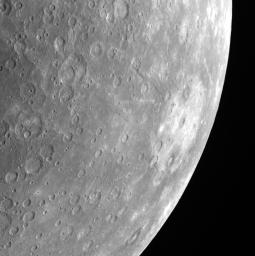
|
Rembrandt Stands Out
- Click the image above for a larger view
- Full-Res JPEG (1020 x 1024) (125.6 kB)
- Full-Res TIFF (1020 x 1024) (1.0 MB)
Caption:
Rembrandt basin can be easily spotted on the right side of this limb image of Mercury. The basin's light crater floor stands out in contrast to the surrounding darker material. Rembrandt is the second largest impact basin on Mercury. You can see Rembrandt basin compared to the size of the United States here .
This image was acquired as part of MDIS's limb imaging campaign. Once per week, MDIS captures images of Mercury's limb, with an emphasis on imaging the southern hemisphere limb. These limb images provide information about Mercury's shape and complement measurements of topography made by the Mercury Laser Altimeter (MLA) of Mercury's northern hemisphere.
Date acquired:
January 01, 2013
Image Mission Elapsed Time (MET):
265508949
Image ID:
3247658
Instrument:
Wide Angle Camera (WAC) of the Mercury Dual Imaging System (MDIS)
WAC filter:
7 (748 nanometers)
Center Latitude:
-43.32°
Center Longitude:
75.38° E
Resolution:
1312 meters/pixel
Scale:
Rembrandt basin has a diameter of 715 kilometers (444 miles)
Incidence Angle:
48.5°
Emission Angle:
52.8°
Phase Angle:
96.5°
Background Info:
The MESSENGER spacecraft is the first ever to orbit the planet Mercury, and the spacecraft's seven scientific instruments and radio science investigation are unraveling the history and evolution of the Solar System's innermost planet. MESSENGER acquired over 150,000 images and extensive other data sets. MESSENGER is capable of continuing orbital operations until early 2015.
For information regarding the use of images, see the MESSENGER image use policy .
Cataloging Keywords:
| Name | Value | Additional Values |
|---|---|---|
| Target | Mercury | |
| System | ||
| Target Type | Planet | |
| Mission | MESSENGER | |
| Instrument Host | MESSENGER | |
| Host Type | Orbiter | |
| Instrument | Mercury Dual Imaging System (MDIS) | |
| Detector | Wide Angle Camera (WAC) | |
| Extra Keywords | Crater, Grayscale, Impact, Radio | |
| Acquisition Date | ||
| Release Date | 2013-07-01 | |
| Date in Caption | 2013-01-01 | |
| Image Credit | NASA/Johns Hopkins University Applied Physics Laboratory/Carnegie Institution of Washington | |
| Source | photojournal.jpl.nasa.gov/catalog/PIA17370 | |
| Identifier | PIA17370 | |
